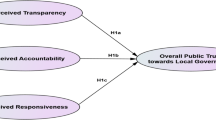Abstract
Over most of history, participants in trust networks such as clandestine religious sects and kinship groups have shielded them from rulers' intervention, rightly fearing dispossession or exploitation. Yet no substantial regime can survive without drawing on resources held by trust networks. In particular, democratic regimes cannot operate without substantial integration of trust networks into public politics. Rulers' application of various combinations among coercion, capital, and commitment in the course of bargaining with subordinate populations produces a variety of regimes. Contemporary democracies face a threat of de-democratization if major segments of the population withdraw their trust networks from public politics.
Similar content being viewed by others
Author information
Authors and Affiliations
Rights and permissions
About this article
Cite this article
Tilly, C. Trust and rule. Theory and Society 33, 1–30 (2004). https://doi.org/10.1023/B:RYSO.0000021427.13188.26
Issue Date:
DOI: https://doi.org/10.1023/B:RYSO.0000021427.13188.26




